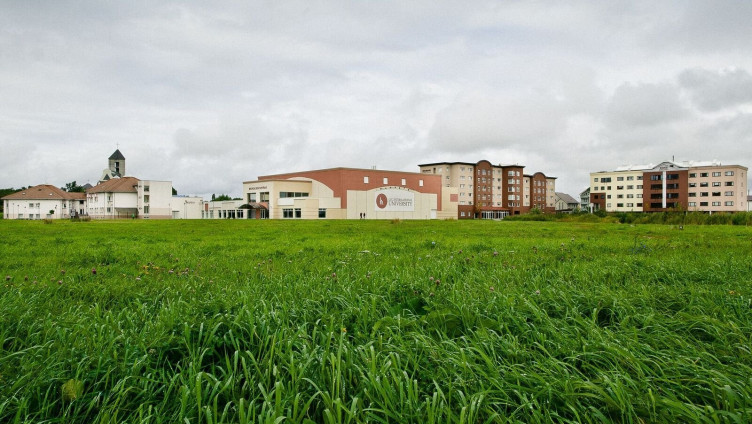What is Wellbeing?
Wellbeing is an active, lifelong process of becoming aware of your choices and making decisions that will help you to live a more balanced and fulfilling life. Everyone’s optimal wellbeing will be different, depending on your own needs, experiences, personality, and circumstances. Different aspects will fall in and out of balance as you make your way through life, however, we can try our best to maintain a balance. Many factors can influence your health and well-being. There are 6 different dimensions of wellbeing, but they all interact with and draw from each other.

The 6 Dimensions of Wellbeing
Emotional and Mental
Emotional and mental wellness is a state of security, resilience, and self-awareness. This leads to a culture of noticing yourself and others and acting with compassion. You have the capacity to work productively and maintain a healthy life balance. Our hope is that everyone will be able to manage stress and challenges, can recognize and manage their own emotions, and positively interact with others.
EXAMPLES OF EMOTIONAL AND MENTAL WELLBEING:
- Accepting yourself for who you are
- Valuing self-exploration & improvement
- Having a generally positive outlook
- Taking care of yourself
- Being willing to ask for help
- Recognizing & managing stressors
STRATEGIES FOR ENHANCING YOUR EMOTIONAL AND MENTAL WELLBEING
Learn how to manage your busy schedule by practicing good time management skills. Focus on the present moment and the things you can control, and make sure you balance your schedule – don’t spend all your time studying or all your time with friends. Learn how to make time for both things! The Student Success Center is happy to help you figure out a great system that works for you! Email ssc@lcc.lt if you would like to schedule an appointment.
Give back! Share your knowledge or skills with others – either fellow students, other people in your life, or the wider community. There are many opportunities to volunteer throughout the academic year, which can be found on the Volunteering Opportunities channel on Microsoft Teams.
Ask for help if you need it! Student Leaders like your RA, FYS Leader, Intercultural Leader, Discipleship Assistant, or Peer Support Coaches are all great resources and can help you get connected to the right resources. Our trained counselors are also available to meet with students for free.
Environmental
Environmental wellbeing is a state of positive interaction with the outside world where you can actively build a pleasant, simulating environment that supports functionality, aesthetics, and sustainability. LCC community members value, understand, and contribute to care of the environments that they are a part of and actively create sustainable practices.
EXAMPLES OF ENVIRONMENTAL WELLBEING:
- Being aware of risks in your surroundings
- Being aware of the impact your decisions have on the environment you live in
- Working to improve your community
- Reducing, reusing & recycling
- Using sustainable transportation
STRATEGIES FOR ENHANCING YOUR ENVIRONMENTAL WELLBEING
Be aware of your surroundings and environment including the people around you. LCC campus and Klaipėda are generally safe communities, but it takes time to really get to know others and their character. If you choose to go to bars or other places in the city, make sure you buy your own drink and keep it in sight at all times. Lock your door if you aren’t home to limit the opportunity for others to enter your space when you aren’t there.
Live a sustainable lifestyle! Eat locally sourced food – you can visit the Old Farmer’s Market (Senasis turgus) to get produce, dairy products, and meat that are locally sourced. There is also a community garden on campus that provides a great way to get freshly grown vegetables and get exercise outside. Minimize waste, use public transportation or walk, and take care of the environment where you live – pick up after yourself, keep things tidy and organized, and take care of the buildings and spaces that you share with others.
Enjoy the outdoors! Klaipėda has a diverse ecosystem from forests to beaches, get out for a walk and enjoy it! Being outdoors and in natural light is associated with improved mood, enhanced morale, lower fatigue, and reduced eyestrain. Spending time outside can also reduce stress, anger and fear, and increase happiness. It can be hard to spend a lot of time in daylight during the winter months, so you can check out “happy lamps” from the DeFehr or Neumann reception desk to get some simulated sunshine.
Intellectual and Occupational
Intellectual and occupational wellbeing is a state of continuous curiosity, intellectual growth, and learning, including the ability to balance work and leisure and take advantage of professional and personal development opportunities. LCC community members should be able to identify strengths and areas for improvement and actively seek resources and opportunities for learning and development.
EXAMPLES OF CAREER AND INTELLECTUAL WELLBEING:
- Seeking out resources to help make decisions
- Challenging yourself with new life experiences
- Having a well-developed sense of self
- Setting career & academic goals
- Having friends & peers who support your goals
- Creating professional networks
STRATEGIES TO ENHANCE YOUR INTELLECTUAL AND OCCUPATIONAL WELLBEING
Find a sense of direction! Without goals you are working towards university life can seem meaningless and you can be unmotivated to do your best. Set some SMART goals, figure out your strengths and weaknesses through personality assessments and personal reflection, take a class (or more) in a subject you don’t know much about, and consider different internship or practicum opportunities.
Take advantage of resources offered at LCC. Sign up for tutoring through the Student Success Center. Meet with the Academic Support Coordinator of Director of Student Success and Wellness. Schedule an appointment with the Career Development Coordinator or talk to your academic advisor if you need some guidance on your options after graduation.
Make sure you are setting yourself up for success by managing your finances wisely. Track your spending, set a budget and stick with it, and try not to spend more money than you have. It’s important to understand how to use credit wisely but you don’t want to go into debt unwisely. Again, talk to someone if you have questions; LCC staff and faculty are here to help you!
Physical
Physical Wellbeing is a state of physical wellness and regular practice of healthy routines including sleep, nutrition, hydration, movement, wise choices in expressing your sexuality, and the prevention of illness. LCC community members should take ownership and accountability for their physical wellness and seek resources to engage in personalized wellness practices.
EXAMPLES OF PHYSICAL WELLBEING:
- Maintaining an active lifestyle
- Eating nutritiously
- Seeing a doctor for regular check-ups
- Limiting alcohol & tobacco use
- Avoiding drug use
- Sleeping enough to feel rested
STRATEGIES TO ENHANCE YOUR PHYSICAL WELLBEING
Set realistic goals – try going for a walk between classes, eating vegetables with most meals, get enough sleep each night, take advantage of the LCC Fitness Center and Trainer, or sign up for an active activity that you can do with friends. Don’t try to do too much too soon or it will be overwhelming.
Think about your physical wellbeing like a ratio – 80% of the time you should make healthy choices like eating healthy and well-balanced meals and exercising regularly, but 20% of the time you can choose to eat foods that are less healthy or skip that workout one day.
Understand how your sexual activity can affect your physical wellbeing. Sex outside of a monogamous, committed relationship (such as marriage) has long-term emotional and physical consequences, including increased exposure to sexually transmitted diseases. Sexual activity without consent from both parties is sexual assault, which should be reported to the Vice President of Student Life. If you have questions or would like to discuss this further meet with a Student Life staff member.
Social and Cultural
Social and cultural wellness is defined as having a safe atmosphere of trust, respect, connection, and belonging, where you are valued, affirmed and openly seek relationships with other. Our hope is that while LCC community members feel known, supported, accepted and that they respectfully engage cultural differences, both while they are here and after they leave our community.
EXAMPLES OF SOCIAL AND CULTURAL WELLBEING:
- Developing healthy relationships with family & friends
- Respecting & understanding other individuals
- Respecting the cultural identities of others
- Limiting unhealthy relationships
- Spending time with loved ones
- Feeling self-confident alone or with others
STRATEGIES TO ENHANCE YOUR SOCIAL AND CULTURAL WELLBEING
Be willing to meet new people and make new friends by being friendly, introducing yourself, joining clubs or organizations on campus to meet people with similar interests, and always be willing to try something new to step outside your comfort zone! Be willing to learn about different people’s experiences and their cultures. Be aware of how your own culture influences how you perceive and interact with others.
Learn how to manage challenging relationships with others well. Consider the other person’s point of view and respect their thoughts and feelings. Be yourself and focus on your own experience in the conflict by using “I” statements and be clear about your needs and expectations. (For example “I feel hurt when…”).
There are a lot of ways to get involved on campus: you can become a student leader, learn more about Residence Life programming, join or start a club, embrace LCC’s multi-cultural identity by attending events hosted by Intercultural Education, or consider studying or interning abroad with the Center for International Education. Whatever you choose, there are so many opportunities
Spiritual
Spiritual wellbeing is a state of being connected to something greater than yourself, valuing the personal need for meaning, purpose, faith, morality and engaging in practices that support those values. LCC community members have opportunities to explore, deepen, and animate their spirituality and faith. We believe that people are nurtured and strengthened through meaningful connections and relationships with God and others.
EXAMPLES OF SPIRITUAL WELLBEING:
- Being connected to God in a relational way
- Developing a full-person (mind, body, soul, emotions, etc.) view of spirituality
- Engaging spiritual practices that reorient you to living life with and for God
- Participating in a larger community
- Recognizing that spirituality is a communal & personal experience
- Respecting the values & beliefs of others
STRATEGIES TO ENHANCE YOUR SPIRITUAL WELLBEING
Explore your own beliefs and values by reflecting on what you believe and why you believe it. Ask questions and have conversations with others about their own worldview and beliefs. Join a Bible study or small group to explore or deepen your faith.
Visit with Campus Ministries to explore discipleship and grow in faith. Talk to Chapel Worship Leaders, Discipleship Assistants, or Interfaith Engagement Leader – all student leaders who are interested in talking about deeper conversations.
Respect the values and beliefs of others. LCC is a diverse place with many different backgrounds and worldviews represented. We hope that this is a place where you can have conversations with others and better understand yourself in the process.
LCC Cares
At LCC, care for our community is essential to our mission and values! Therefore, we organized several ways to provide our community assistance with meeting basic needs due to unexpected circumstances.

Students, staff and faculty are able to:
- request assistance
- refer someone for assistance
- offer assistance
There are three main areas of LCC Cares:
- LCC Feeds: Food pantry program providing basic foods to students experiencing temporary food insecurity
- LCC Funds: Emergency Care Fund for students in need of minor financial assistance for unexpected expenses.
- LCC Gives: non-monetary or non-food items such as clothing and home goods
We recognize that asking for help takes a lot of courage and humility. The information shared on this form is kept private. The LCC Cares team receives all requests and will reach out to you about your needs.
